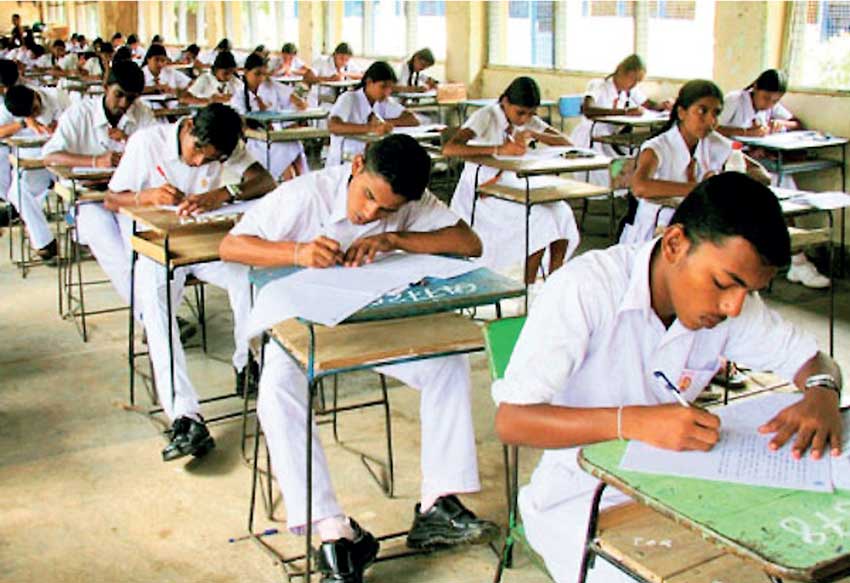24 Oct 2017 - {{hitsCtrl.values.hits}}

As Sri Lanka enters an increasingly competitive international environment with a renewed emphasis on transforming itself into a modern economy, the importance of promoting technological innovations and generating an educated workforce with market oriented skills cannot be over emphasized.
High quality human resources with science and technology knowledge and a skilled labour force are necessary to keep up and improve on the country’s global competitiveness.
Link between access to tertiary education and skills mismatch
As of 2014, only 5 per cent of 20-24 year olds were enrolled at a university, while another 8 per cent were enrolled in other educational institutions and only a 3 percent of the same age group were enrolled in technical education and vocational training (TEVT) courses.
The main reasons behind this lower tertiary enrolment include capacity constraints of the state university system, unavailability of a proper parallel higher education system with private sector involvement, and an underdeveloped TEVT sector.
Given these, most of the school leavers usually find unskilled work or engage in casual jobs. This limited higher educated human capital acts as a constraint in catering to the labour market demand for advanced skilled workers.
ICT and English language are the most demanded soft skills in the country. Individuals competent in English have access to better quality jobs with higher salaries and benefits in the domestic labour market as well as internationally.
However, the census of population and housing 2012 data conducted by the DCS reveals that of the age 15 and above population, English literacy (ability to speak, read and write) and computer literacy were around 22 per cent and 23 percent, respectively. This situation creates a gap in meeting the demand for soft skills as previously noted.
The primary reason behind this skills mismatch is that the quality of the general and higher education systems – provided mainly by the public sector – does not transmit much productive skills to students. Also, there are supply side bottlenecks for more demanding subjects such as Science, ICT education, etc. at the school level -- out of 10,162 schools only 10 percent have the facilities to teach A-Level in the science stream. These have resulted in mismatches between the demands of the market and the skills of school and university graduates.
Sri Lanka also does not appear to produce graduates with the necessary skills needed for the job market. There is a mismatch in the courses offered by universities and competencies needed by the private sector. A major reason for the skill mismatch is the outdated curricula, aggravated by the lack of interaction with the private sector when designing degree programmes.
For example, of those who do attend a university, nearly one-third are studying in the Arts stream, whereas these Arts graduates are less employable when compared to graduates of other subject streams.Finally, there is no proper career guidance system to advise school leavers leading to an inadequate flow of information between youth and the labour market. Inadequate information flows between the youth and the labour market such as of the types of job opportunities in the labour market, limit the aspirations, and life goals of youth.
Inadequate information flows between the youth and the labour market such as of the types of job opportunities in the labour market, limit the aspirations, and life goals of youth
Reforms to bridge skill gaps to world of work
It is essential to reform the school and university curricula by introducing more market oriented subjects such as ICT/technological subjects as core subject in each A-Level subject stream, especially in the arts stream, in order to bridge the gap between demand and supply for these vital skills.
It is also a necessity to provide access to equal opportunities for education to all students across the country. Opportunities for education in science should be extended to remove involuntary discrimination for science education. While the number of science teaching schools needs to be increased to address equitable distribution, the technology stream should be strengthened where provision of science teaching is not possible.
It is essential setting national standards for all tertiary providers to revamp controversy surrounding of private higher education providers. Also, state universities should change to become dynamic centers of teaching and learning that will react to changes in the market in a timely manner. Curriculum should be reformed to match the skills demands of the globalized labour market with sufficient practical applications. Linkages should be developed between universities and private sector when designing the courses, securing the relevance of training to the changing needs of enterprises and labour markets.
A minimum of two years training is recommended for students after sitting for O-Levels to address the skill gaps of school leavers. Training programme should be more work-oriented technical training in different fields such as hotel, construction, textile and garment sectors, etc. Vocational education systems should be linked with industries that can absorb these students.
A minimum of two years training is recommended for students after sitting for O-Levels to address the skill gaps of school leavers
To address the labour market information gap among school leavers, awareness and absorptive capacities of industries, as well as education and training institutes needs to be developed. Raising awareness should be done at the school level after sitting for O-Levels. This awareness campaign should be done in a well-planned manner, with the involvement of vocational training authorities, private sector institutes, etc.
(This Policy Insight is based on the comprehensive chapter on Bridging the Skill Gaps in Sri Lanka in the ‘Sri Lanka: State of the Economy 2017’ report - the flagship publication of the Institute of Policy Studies of Sri Lanka (IPS))
25 Nov 2024 58 minute ago
25 Nov 2024 1 hours ago
25 Nov 2024 2 hours ago
25 Nov 2024 4 hours ago
25 Nov 2024 4 hours ago